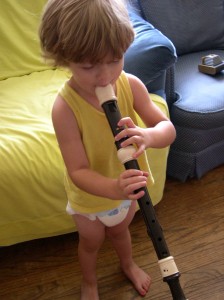Study: Questioning the cognitive benefits of music classes
December 18, 2013//Comments Off on Study: Questioning the cognitive benefits of music classes
 The ‘Mozart effect’ of having kids study music? It’s only a myth, researchers find (Washington Post):
The ‘Mozart effect’ of having kids study music? It’s only a myth, researchers find (Washington Post):
- “Children get plenty of benefits from music lessons: Learning to play an instrument can be a great outlet for a child’s creativity, and the repeated practice can teach much-needed focus and discipline. What’s more, the payoff, whether it’s learning a new song or just mastering a new chord, is often a boost of self-esteem. But Harvard researchers now say that one oft-cited benefit — that studying music improves intelligence — is a myth…Though dozens of studies have explored whether and how music and cognitive skills might be connected, Mehr and colleagues found just five studies that used randomized trials. Only one showed an unambiguously positive effect, and it was so small that it was barely enough to be statistically significant.”
- Abstract: Young children regularly engage in musical activities, but the effects of early music education on children’s cognitive development are unknown. While some studies have found associations between musical training in childhood and later nonmusical cognitive outcomes, few randomized controlled trials (RCTs) have been employed to assess causal effects of music lessons on child cognition and no clear pattern of results has emerged. We conducted two RCTs with preschool children investigating the cognitive effects of a brief series of music classes…After six weeks of class, we assessed children’s skills in four distinct cognitive areas in which older arts-trained students have been reported to excel: spatial-navigational reasoning, visual form analysis, numerical discrimination, and receptive vocabulary…and the combined results of the two experiments were negative: overall, children provided with music classes performed no better than those with visual arts or no classes on any assessment. Our findings underscore the need for replication in RCTs, and suggest caution in interpreting the positive findings from past studies of cognitive effects of music instruction.
Related (and more nuanced) articles:
Posted in Brain/ Mental Health
About SharpBrains
SHARPBRAINS is an independent think-tank and consulting firm providing services at the frontier of applied neuroscience, health, leadership and innovation.
SHARPBRAINS es un think-tank y consultoría independiente proporcionando servicios para la neurociencia aplicada, salud, liderazgo e innovación.


